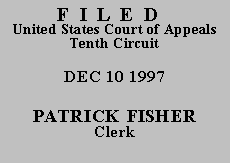

| DONALD R. JOHNSON,
v.
STATE OF UTAH |
No. 97-4059
(D.C. No. 96-CV-168) (Utah) |
While awaiting trial on several state charges, Mr. Johnson filed this habeas petition under 28 U.S.C. § 2254, seeking the dismissal of his state case on double jeopardy, speedy trial, and ineffective assistance of counsel grounds. The district court dismissed his petition without prejudice. Mr. Johnson appeals, and we affirm(1).
Mr. Johnson originally pled guilty to two counts of aggravated sexual abuse of a child. He filed a pro se motion for an order vacating his plea. The state trial court granted his motion and scheduled a trial date. At the same time, Mr. Johnson had a post-conviction appeal pending in Utah Supreme Court requesting that his plea be vacated. In light of the trial court's actions, the Utah Supreme Court granted Mr. Johnson's motion to dismiss the pending post-conviction appeal. Before trial, Mr. Johnson moved to dismiss the prosecution on speedy trial and double jeopardy grounds. The state court denied the motion but vacated the trial date to allow Mr. Johnson to move for an interlocutory appeal of this order. The Utah Supreme Court declined to hear the interlocutory appeal.
Mr. Johnson filed this petition for habeas corpus asserting three grounds for relief. First, he contends the state is subjecting him to double jeopardy by retrying him after the withdrawl of his guilty plea and after a civil forfeiture. Second, he asserts that his lengthy pretrial incarceration resulted in a violation of his right to a speedy trial. Third, he alleges his first set of counsel was ineffective for failing to pursue a direct appeal of his guilty plea (which Mr. Johnson eventually got withdrawn and vacated). The district court dismissed the petition without prejudice. The court reasoned that even if Mr. Johnson had exhausted his claims, under Dolack v. Allenbrand, 548 F.2d 891, 894 (10th Cir. 1977), a pretrial habeas petition "aimed at stopping the state prosecution" could not be granted absent "special circumstances." The court found that Mr. Johnson's claims were without merit and therefore no special circumstances exist in this case. Moreover, the court concluded that Mr. Johnson had not exhausted his ineffective assistance of counsel claim, and thus presented at least a mixed petition requiring dismissal. See Rose v. Lundy, 455 U.S. 509 (1982).
On appeal, Mr. Johnson makes the same arguments.(2) After reviewing Mr. Johnson's appellate brief and the record, we AFFIRM for substantially the reasons set forth in the district court's order dated March 31, 1997.
ENTERED FOR THE COURT
Stephanie K. Seymour
Chief Judge
*.This order and judgment is not binding precedent, except under the doctrines of law of the case, res judicata, or collateral estoppel. The court generally disfavors the citation of orders and judgments; nevertheless, an order and judgment may be cited under the terms and conditions of 10th Cir. R. 36.3.
1. Mr. Johnson filed a motion for a certificate of appealability, which we construe as one for a certificate of probable cause since he filed his petition in district court before the effective date of the Antiterrorism and Effective Death Penalty Act. See United States v. Kunzman, 125 F.3d 1363 (10th Cir. 1997). We grant the certificate of probable cause.
2.Mr. Johnson also asserts he has been physically unable to file a direct appeal of his recent state court conviction due to the conditions of his confinement. We decline to consider new issues raised for the first time on appeal.